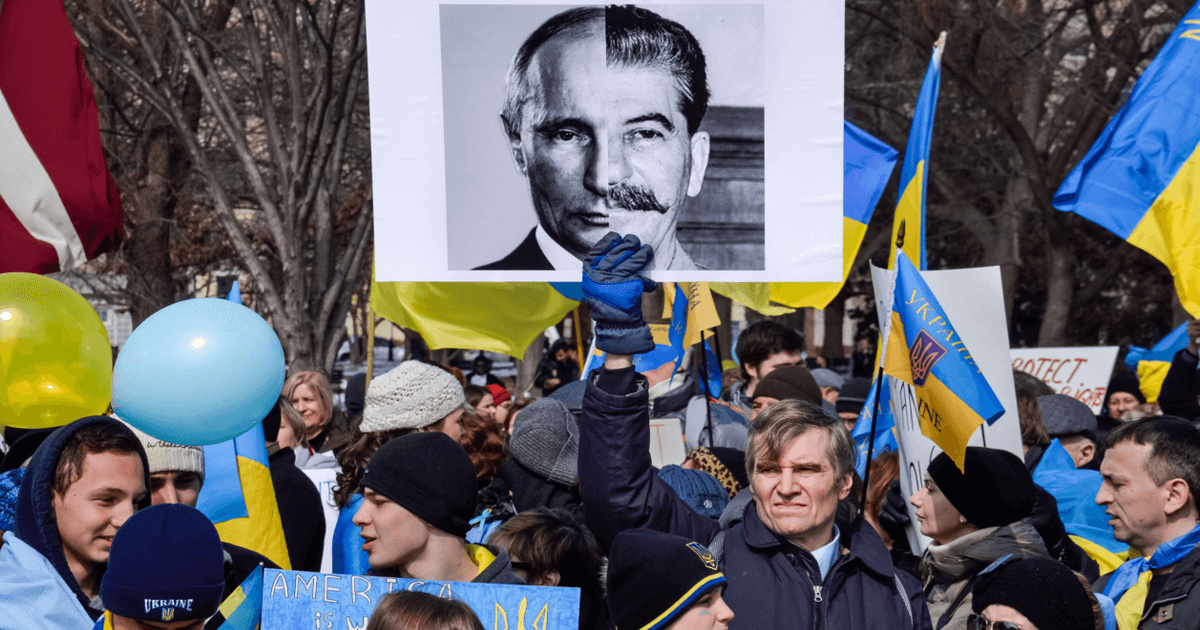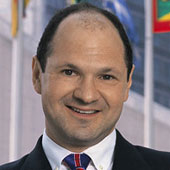Putin, the Stalinist
Putin’s similarity to Stalin may help predict Russia’s future.
October 5, 2023

A Global Ideas Center, Strategic Assessment Memo (SAM) from the Global Ideas Center
You may quote from this text, provided you mention the name of the author and reference it as a new Global Ideas Center, Strategic Assessment Memo (SAM) published by the Global Ideas Center in Berlin on The Globalist.
Vladimir Putin’s Russia has been getting more repressive and authoritarian for a long time. However, since the start of the war in Ukraine, Russia’s security apparatus has cracked down savagely on every sign of dissent.
Jail terms for opposition politicians, measuring up to twenty years, significantly surpass in severity and length anything seen during the Soviet suppression of dissidents in the 1970s. They have even been compared to Stalin’s purges.
On the road to Stalin’s purges?
Of course, repression in today’s Russia is still a far cry from Stalin’s Great Terror when millions of people were starved, executed or sent to the Gulag.
Nevertheless, there are many real similarities between the two Russian rulers. Since Russia’s historic arc is shaped by patterns tending to repeat themselves over and over again, lessons from Stalin’s life may hold the key to the way Putin’s Russia will develop going forward.
Let’s start with the personalities
Both Stalin and Putin share being short in size. As children, they were physically unimposing and were often beaten up on the mean streets of Stalin’s Gori and Putin’s Leningrad.
Both developed into highly secretive and manipulative men. Stalin never forgot a single insult or slight. Indeed, to get even in his own mind, he exacted a murderous revenge, not only on the offenders, but on their families as well.
Putin, too, holds grudges. Like Stalin, he is patient enough to wait until the dish of vengeance is served cold – witness the exodus of Prigozhin.
It is as though both Stalin and Putin followed Don Corleone’s advice to his son Michael – always to take all family business personally.
No extroverts
Stalin was understated and pretended to be abstemious and modest, and Putin projects a similar image.
This makes him quite different from his boisterous, extroverted predecessors – men like Nikita Khrushchev, Leonid Brezhnev and Boris Yeltsin.
From total obscurity to unchallenged rulers
Then compare their political careers. Both Stalin and Putin spent the first half of their lives in total obscurity.
Actually, both had murky criminal connections: Stalin with gangs in the Caucasus and Putin, after an undistinguished career in the KGB, with the St. Petersburg underworld.
In any case, nothing in their background suggested that, by the age of fifty, each would become an unchallenged ruler of the largest country in the world.
Both owed their spectacular rise to major turbulent events affecting their country – the Bolshevik revolution in Stalin’s case and the collapse of the Soviet Union in Putin’s.
Emerging from the shadows after major events
Neither man was a major player in those events, and both emerged from the shadows of previous leaders – Lenin and Yeltsin.
Having succeeded them, Stalin and Putin took time to shore up their personal power in order to set themselves up as leaders for life.
When the Russian Empire disappeared in 1917, it lost some of its dependencies. The same happened when the Soviet Empire collapsed in 1991. Stalin eventually reoccupied the three Baltic States and also tried to reverse Finland’s independence, starting the 1939-40 Winter War.
Relying on lousy generals
Putin often talks about reversing Soviet losses and seems to have taken Stalin’s failed invasion of Finland as a model in attacking Ukraine.
In both cases, their preparations were inadequate, their generals were incompetent and the casualties were massive.
Finland proved too hard a nut to crack and Ukraine continues to resist successfully. It inflicts one defeat after another on the seemingly superior Russian forces.
70 years of age as a watershed
For Stalin, reaching the age of seventy in December 1948 became a kind of watershed – and so it seems for Putin, who turned seventy in October 2022.
The year 1948 saw the start of a new wave of domestic repression which was followed eighteen months later by the Korean war – the first armed conflict of the Cold War era. Historical evidence suggests that Stalin viewed it as the start of his final confrontation with the West.
Putin started the first hot war in Europe since World War II in his seventieth year. He, too, sees it as an ultimate confrontation with the West. Putin’s propaganda keeps repeating that Russia is at war with all of NATO and that it is defending universal morality.
Will Putin mimic Stalin’s antisemitic campaign?
In his seventieth year, Stalin also unleashed a nasty antisemitic campaign. It was inaugurated with the arrest and execution of writers and poets writing in Yiddish and culminated in the infamous “Doctors’ Case.” A number of prominent physicians (mostly of Jewish origin) were accused of plotting to murder Soviet leaders.
Putin’s Russia has not yet turned on the Jews. The wave of Russian nationalism and outright racism stirred by the war is directed against Ukrainians – for now at least.
But such nationalism sooner or later will find Jewish targets – as it usually does. In fact, some of the most ardent supporters of Putin’s war are also antisemitic, and they openly express their disgust at the large number of Jews around Putin.
Succession anyone?
Succession is always a thorny issue in authoritarian regimes. The struggle to succeed Stalin also began around his seventieth birthday.
Early favorites were younger party apparatchiks associated with Leningrad party boss Andrei Zhdanov. However, Zhdanov died in 1948 and his followers lost the fight to another faction. They were arrested, accused of high treason and executed.
Then, in the early 1950s, Stalin began to groom another group of young party officials who were supposed to replace his old Politburo.
But then, in March 1953, Stalin suddenly died. While allegations that he was poisoned remain unproven, it is a fact that the members of his old Politburo, upon discovering that he had had a stroke, simply left him to die.
The succession struggle around Putin
Putin seems robust, but the succession struggle around him appears to have begun. Of the two known main contenders, Wagner founder Evgeny Prigozhin died in a plane crash in August and Chechen leader Ramzan Kadyrov is reported to be near death — possibly poisoned.
Those two events may not be connected. However, the fact that these two men are the only two men in Russia who had their own private armies should escape no one’s attention.
Forming private armies to claim Putin’s mantle?
Meanwhile, other major figures in Putin’s entourage – including Igor Sechin of Rosneft and Alexei Miller of Gazprom, the heads of large state-owned resource companies, are hastily forming private armies of their own.
Whether or not Prigozhin and Kadyrov were actually victims of a nascent fight for succession, one thing is certain: When that fight does take place in earnest, it is going to be long and bloody.
Takeaways
Russia’s historic arc is shaped by patterns tending to repeat themselves over and over again.
Lessons from Stalin’s life may hold the key to the way Putin’s Russia will develop going forward.
Both Stalin and Putin developed into highly secretive and manipulative men. Like Stalin, Putin is patient enough to wait until the dish of vengeance is served cold – witness the exodus of Prigozhin.
It is as though both Stalin and Putin followed the “Godfather” Don Corleone’s advice to his son Michael always to take all family business personally.
Both Stalin and Putin spent the first half of their lives in total obscurity. Actually, both had murky criminal connections.
Nothing in Stalin’s and Putin’s background suggested that, by the age of fifty, each would become an unchallenged ruler of the largest country in the world.
Putin often talks about reversing Soviet losses and seems to have taken Stalin’s failed invasion of Finland as a model in attacking Ukraine.
For Stalin, reaching the age of seventy in December 1948 became a kind of watershed. And so it seems for Putin, who turned seventy in October 2022.
Putin’s Russia has not yet turned on the Jews. The wave of Russian nationalism and outright racism stirred by the war is directed against Ukrainians — for now at least.
The succession struggle around Putin has apparently begun. Of the two known main contenders, Wagner founder Evgeny Prigozhin died in a plane crash in August. And Chechen leader Ramzan Kadyrov is reported to be near death — possibly poisoned.
A Global Ideas Center, Strategic Assessment Memo (SAM) from the Global Ideas Center
You may quote from this text, provided you mention the name of the author and reference it as a new Global Ideas Center, Strategic Assessment Memo (SAM) published by the Global Ideas Center in Berlin on The Globalist.


